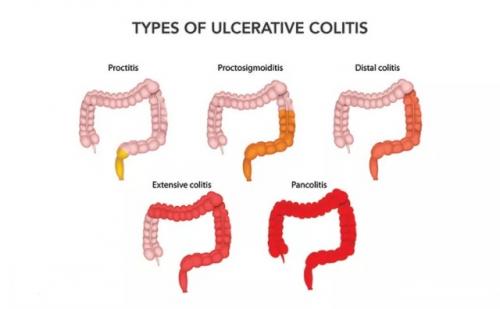Ulcerative Colitis: Types, Symptoms, and Causes

The human digestive system comprises of several hollow and solid organs that help in absorbing nutrients from food and beverages. The ![]() small intestine and colon are integral organs of the GI tract that need to function properly at all times. When there is the presence of inflammation in either of these intestines, then it can be diagnosed as inflammatory bowel disease or IBD. Ulcerative colitis, one of the most common forms of IBD, requires immediate medical attention as it affects the inner lining of the large intestine and the rectum.
small intestine and colon are integral organs of the GI tract that need to function properly at all times. When there is the presence of inflammation in either of these intestines, then it can be diagnosed as inflammatory bowel disease or IBD. Ulcerative colitis, one of the most common forms of IBD, requires immediate medical attention as it affects the inner lining of the large intestine and the rectum.
Mentioned below are four of its types, based on location:
- Ulcerative proctitis – A mild form of ulcerative colitis in which inflammation is prevalent near the rectum or anus, hence, the possibility of rectal bleeding is very high.
- Proctosigmoiditis – The affected area in this condition begins from the end of the colon and stretches to the anus. Bowel obstruction can take place in this type of ulcerative colitis.
- Left-sided colitis – Irritation and swelling can be observed in the rectum along with the lower side and descending colon. Cramping and pain on the left side of the body can be felt.
- Pancolitis – The entire colon is inflamed in this severe condition due to which bloody diarrhoea, fatigue, and sudden weight loss can be experienced.
Symptoms
Ulcerative colitis is known to have varying symptoms in human beings. In most cases, the indicators present itself based on the amount or severity of inflammation taking place in the colon. Some of the most common signs are diarrhoea with pus or blood, abdominal pain, cramping, rectal pain, the urgency to defecate, rectal bleeding, unintentional weight loss, fatigue, and fever. Some individuals might also develop soreness or pain in the joints, pain in the eyes, canker sores, and dehydration. If any of these symptoms do not go away within a few days, then a gastroenterologist should be referred to.
Causes
Although there is no cause known to mankind behind the occurrence of ulcerative colitis, stress and dietary habits are considered to play a significant role. This means that individuals who are stressed about their work or personal life often experience this form of IBD. Similarly, eating unhealthy foods and consuming alcohol in large quantities on a daily basis can also cause ulcers in the lining of the colon and rectum. Another reason behind this inflammation is the abnormal response of the immune system. This happens when white blood cells are trying to fight off foreign bodies present in the digestive tract but end up attacking the healthy cells. Due to this, a negative chain reaction begins and ulcers form in the large intestine. Family history is another risk factor that is found in some cases; however, it is not valid for all ulcerative colitis patients.
Ulcerative colitis is diagnosed with an endoscopy conducted by an experienced best Endoscopist at Gangaram Hospital or any other top hospital in Delhi NCR. Consuming a healthy diet and antibiotics can help in treating this disease successfully. In severe cases, surgery is suggested in order to remove the infected part of the colon (colectomy).


Comments